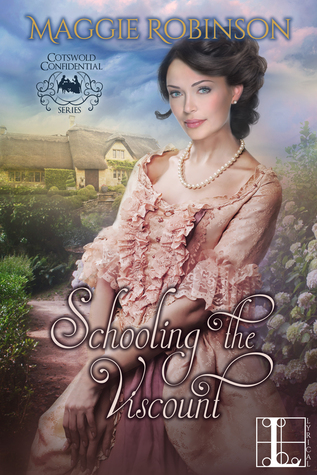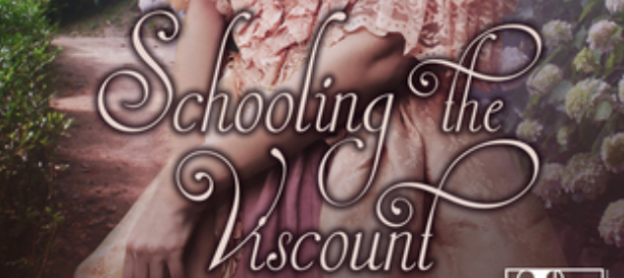My kindle has died. Or rather, it’s decided charging is no longer a thing it wishes to do, and Google tells me that’s a rather common problem. Apparently, the charging port isn’t well soldered. I’ve ordered a new one, but it’s yet to be delivered. In the mean time, I decided this was a good time to concentrate on clearing a few physical books off my shelf.
By chance, I chose Unmasked by the Marquess as the first one. And since I enjoyed the historical romance, I decided to continue with the aristocratic theme. I read My One and Only Duke and then My Once and Future Duke (the similarity of those titles cracked me up, BTW) and now Maggie Robinson‘s Schooling the Viscount. I won a paperback copy through Goodreads.

Description:
Captain Lord Henry Challoner is a young viscount who’s left his ambition on the plains of South Africa. Wounded in the First Boer War, he’s come home and wishes he were anywhere else, until his desperate father sends him to Puddling-on-the-Wold to rusticate and recalibrate. How can Henry have any fun without any alcohol, or worse yet, any women? Kept under house arrest under the watchful eye of his draconian housekeeper and earnest local vicar, he’s bored enough to begin speaking to sheep until he literally stumbles across schoolteacher Rachel Everett.
Rachel knows she’s not on Henry’s improvement plan, but can’t seem to avoid or repel him no matter what she does to keep him at arm’s length. Could it be that she quite enjoys being in his arms, even if it’s against all the Puddling Rehabilitation Rules? Can Rachel circumvent the town fathers and Henry escape his personal jailors and demons?
Review (with minor spoiler):
My husband asked me, this morning, what my plan for the day was. I responded that I was going to “fold laundry, finish the horrible book I’m reading, and maybe play some Overwatch in the evening.” That should tell you how I feel about Schooling the Viscount. This book was almost everything I dislike in historical romance, romance in general actually. It’s exactly the kind of drivel that caused me to say, for years, that I wouldn’t read romance novels (until I realized it wasn’t the romance I disliked, but the treatment of it and women in them).
Let me start with two examples from early in the book, along with a little context to make them make sense. (This is also the spoiler I mentioned.) When Lord Challoner first comes across Rachel (the first women under 50 he’s seen in a week) he falls down. He then pulls her into his lap and holds her there as she struggles to get up. He then kisses her against her will and when she slaps him, he pretends infirmity to continue to hold her as he rubs his erection against her. When finally they stand up, he goes for her again and she hits him again. Even by modern standards this is assault. She was a perfect stranger to him and he’s just accosted her.
However, this is her later thought on the matter: “…in fact, she was beginning to wonder whether the man was as bad as he was supposed to be.” (The inference being that he isn’t.) He’d been sent to the Cotswald rehabilitation center because his father caught him in bed with two women (prostitutes). So, Rachel’s decision that he wasn’t so bad as his reputation is flat out bull shit. He’s worse.
Not too long later, he comes across her again. Her dog is worrying his walking stick. So he sneaks a knife out, cuts his own leg and pretends her dog bit him. Thereby tricking her into taking him into her home in the middle of the night for treatment. Her thoughts on this matter: “Even though he’d tried to trick her, Rachel couldn’t fault the man. He’d been lonely and wanted a few more minutes of her company.”
Keep in mind that this is supposed to be 1881, England. The irreparable harm he could do to her reputation and future prospects with either of these tricks boggle the mind. But somehow I’m supposed to believe he’s a good man and she’s just kind-hearted, not just flat out stupid. And he’s attracted to her specifically, not just the only woman he interacts with. The whole book continues in this vein, him being horrible and her falling in love with it. It makes no sense, doesn’t fit the time period at all, and irritated me like god damned dermatitis.
In fact, nothing about the book felt like 1881. The language, the viewpoints, the general tone of the book all felt anachronistic. I will grant that the descriptions of PTSD were well handled, even if it seemed to miraculously disappear with the love of a good women. (Yes, that’s an eye-roll you sense in my tone.) And the writing is passable. My only big complaint being how often Rachel said, “Dad,” in her conversations with her father. It was too many to feel natural. But all in all, I finished this book by force of will alone and hated almost every page of it.
